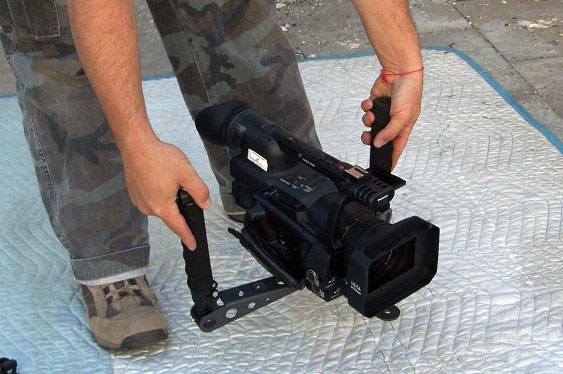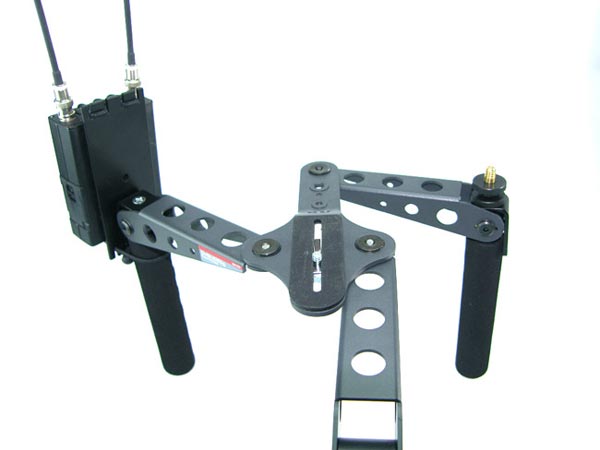In many ways, the DVMultiRig
Pro is the Swiss Army knife of camera mounts and braces. It can
be used as a basic shoulder mount, as a "multirig stabilizer"
in the "fig rig" genre or as a "steadicam"
with the stabilizer rod and belt holster. Or the rig can be quickly
configured into a ground or table tripod. Any of the friction
points, handgrips, and accessories can be adjusted to suit the
circumstances. The components are well constructed, and stylish.
The DvMultiRig comes in three stock configurations with price
corresponding to features and accessories. I evaluated the top
end Pro version, which runs $399.00.
When the demo unit arrived late last
month, I was immediately surprised at how small the packaging
was. The rig shipped folded up and appeared insubstantial for
its intended use. I was wrong. Once fully unfolded and configured,
it felt and acted as a solid piece of equipment. The device is
supplied with the numerous accessories, and is shown compacted
and expanded:

The company recently improved its original
design to provide additional tools and options. The earlier adjustment
device has been replaced by an Allen wrench for tightening friction
joints. Additional threads to attach the support rod to accommodate
front heavy cams with adaptors, matte boxes, and filters, and
for attaching camera plates have been provided. The handgrips
are now longer and easily accept remote controls. A user manual
incorporating these modifications is available at the company's
web site.
Characteristics. While the DvMultiRig Pro is the company's top
end offering, all three configurations of the rig share the primary
characteristics of compactness, versatility, quality construction,
and ease of use.
The basic device weighs approximately
a pound and a half (600 grams). When completely folded, it can
be transported easily, and quickly reassembled in various modes.
Here are a few; check the company's web site for other configurations.

Even the flexible tipped double spring-loaded support rod will
retract from 31- to 16-inches when transporting the unit. As
aside, this support rod is emblematic of the rig's quality overall
construction, and ease of use. You extend the rod by loosening
the brace locks, and adjusting the "load" at two points
to meet your height. A similar brace-lock is used to adjust the
inner tube to facilitate better stability as a shoulder mount.
In fact, the whole unit and accessory
pack demonstrates an attention to detail and a quality build.
I used the rig to shoot the second half of a college football
playoff game. The rig was set up as shoulder mount in less than
a minute.
Overall Impressions: All testing was done using a Panasonic
HVX200 DVCProHD camcorder. The cam with battery and p2 cards
weighs in at approximately 5.5 pounds. This results in a combined
weight of a little more than 8 pounds in the basic shoulder mode.
Rotate the front arms towards the cam, and the whole unit felt
lighter. When fatigue became an issue, I used the rig as a tripod
to secure some ground level shots on the football field.
I switched to the shoulder mount with
the support pod and holster mount, and the HVX200 was more manageable.
I got some nice tracking shots of the playoff action while moving
laterally. This mode did not produce true "steadicam"
shots, but it provided smooth tracking footage with no appreciable
set up time. This is attributable to the design of the rod: a
flexible tip screwing into the rig combined with a telescoping
rod to absorb movement very well.

I did not test the two-hand stabilizer
mode, or using this mode with the flexible pod. My view, however,
is that the former mode mimics the look and feel of "fig
rig" style shots, while the latter appears an alternative
method to gather smooth pans. The company supplied a view in
the "dual grip low" mode.

DTE Hard Drive Configurations: The DvMultiRig Pro supports attaching Direct
To Edit (DTE) devices such as the Focus
Enhancements' FS-100 using the included accessory plate in
the shoulder brace mode. The company suggests this arrangement
to maintain the overall balance of the rig. DTEs also may be
mounted on either grip. Other devices, such as wireless receivers,
also can be placed on the grips and or the accessory plate.

Again, to maximize balance, align the
mount position with the support pod line, and use the front 3/8"
thread for better balance.
Attention to Detail: The rig is constructed using first-rate materials.
The lock levers on the grips and elsewhere are brass, the base
bracket and arms assembly contain adjustable friction joints.
The base assembly and nearly all accessories are metal. My understanding
is that the base assembly uses aluminum to account for its 1.5
lb (600 gram) weight. The rig both feels and is substantial.
And it looks pretty cool as well.
I had a minor problem with the brass
lock lever on the front right grip.
When I brought it to the company's attention, I learned that
the unit would be replaced for free for any defects within the
one-year warranty. And you retain the old unit until the replacement
is received.
Recommendation: This diverse camera mount can be quickly
configured to meet a variety of shooting environments and needs.
It is well-constructed, light weight, and designed with a shooter
in mind. The company provides an excellent warranty, is open
to suggestions, and responsive. If you are budget minded and
want a great bargain, this is well worth the money.
Copyright ©2006 David
A. Saraceno
David A. Saraceno
is a motion graphics artist located in Spokane, Washington. He
has written for DV Magazine, AV Video, MacHome Journal, and several
state and national legal technology magazines. David also moderates
several forums on 2-pop.com.